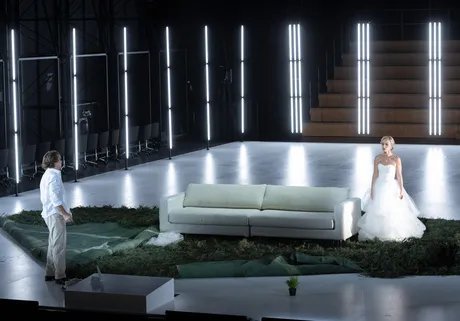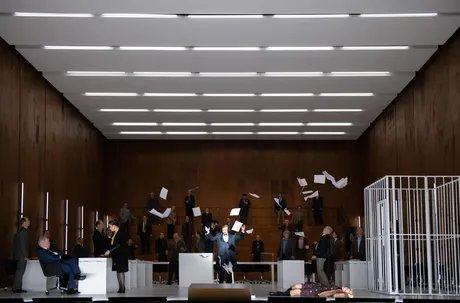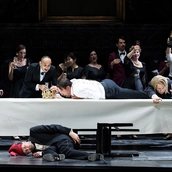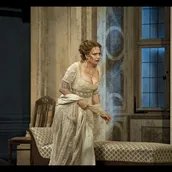
Elsa von Brabant is accused of murdering her brother. No one dares prove the young woman’s innocence in this mysterious case. Trapped in a reality that no one seems to share with her, a man enters her life promising to fight for her cause – on one condition: Elsa must trust him blindly and never ask him his name or birthplace.
But an intrigue entices Elsa to break her promises. The man’s answer reveals his divine origin and brings back Elsa’s brother; but she pays a high price.
Wagner wrote »Lohengrin« during a time of radical revolutionary change. It was premiered in Weimar in 1850 under the direction of Franz Liszt.
In it, he addresses the need to oppose social reality with a utopian one that refuses to put love, truthfulness and justice at the service of blind civil obedience.
Wagner used Wolfram von Eschenbach’s »Parsifal« epic, sagas by the Brothers Grimm and various fairy tale collections as a model.
The Spanish opera and theatre director Calixto Bieito leads the audience through his artworks by a »spirit of presence« and introduces himself for the first time at the Staatsoper Unter den Linden with this great romantic opera.
Cast
Musical director: Simone YoungDirector: Calixto Bieito
Stage director, rehearsal director: Caroline Staunton
Set design: Rebecca Ringst
Costume design: Ingo Krügler
Lighting design: Michael Bauer
Video: Sarah Derendinger
Chorus rehearsal director: Dani Juris
Heinrich der Vogler: René Pape
Lohengrin: Eric Cutler
Elsa von Brabant: Elza van den Heever
Friedrich von Telramund: Wolfgang Koch
Ortrud: Anja Kampe
King's Herald: Arttu Kataja
Orchestra: Staatskapelle Berlin
Chorus: Staatsoper Chorus
Additional information
Duration: approx. 4:30 h including two intermissions after the 1st and 2nd lift
Language: In German with German and English surtitles
Recommended age: 16 years and older
Preface 45 minutes before the performance in the Apollosaal
Elsa’s dream.
ACT ONE
Elsa, the daughter of the deceased Duke of Brabant, is put on trial. She is accused by Count Friedrich von Telramund of murdering her brother Gottfried to seize power in the country herself. Telramund had been promised Elsa’s hand in marriage by the old Duke, but she rejected him. So he took Ortrud as his wife, the last woman left in the pagan princely line that originally ruled the land.
King Henry, who actually came to mobilize troops for his empire, now calls on Elsa to defend herself before court. Instead, she tells of how a noble, God-sent knight appeared to her in a dream, and how she wants to entrust him with her defense and her life. The king calls for a trial by ordeal, where the guilt of the accused would be decided in a life or death duel. When Elsa calls out despairingly for a knight to fight Telramund, a stranger appears. He is ready to fight for Elsa and would like to marry her, but only under one condition: that she never ask him his name or his origin. Elsa trusts him blindly. Telramund falls in the duel, but the stranger grants him his life.
ACT TWO
That night, Telramund, dishonored and banished, makes serious accusations against his wife of Au him to give false testimony against Elsa. But Ortrud sticks to her story and accuses the stranger of only having won the trial by ordeal using magic. As soon as he is forced to mention his name, his powers would disappear. Ortrud once again succeeds at manipulating Telramund. Now her husband is even ready to contribute to her plotting against Elsa and the stranger.
Elsa is happy about her love. Ortrud seizes the opportunity and is able to awaken Elsa’s sense of pity with feigned cries for help and demonstrations of humility. When Elsa takes in the rejected outcast trustingly, Ortrud begins to subvert her faith in the godsent knight.
At the break of day, the king’s herald announces the banning of Telramund and the marriage of Elsa to the stranger, who the next morning is to lead the troops off to war for the king.
At the wedding march, Ortrud suddenly stands in the way of the bride and demands precedence because Elsa’s future husband is of dubious background. Telramund accuses the stranger of sorcery and demands he reveal his identity. But the stranger only gives one person this right, Elsa. Struggling with doubts, Elsa once again is able to reaffirm her belief in her savior. Secretly, Telramund plans to surprise the stranger on the night of his marriage.
ACT THREE
When Elsa and her husband are alone after the wedding for the first time, she feels an urgent need to know more about her husband. Even when he declares his love for her, Elsa is unable to control her increasing suspicions, she has to ask him his name and origin. Then Telramund appears to avenge himself against the stranger. But the stranger remains uninjured and only wants to reveal his identity to Elsa in full public view.
Before king and people, the stranger accuses Elsa of having broken her promise, and so he has to reveal his secret. He is Lohengrin, the son of Parzival. As an emissary of the Holy Grail, he travels around the world to defend persecuted innocents, but only as long as he remains unrecognized. Now neither Elsa’s nor the king’s request could hold him back. Sorrowful, Lohengrin must go his way. Ortrud triumphs, declaring that she has enchanted the young Gottfried. When the heir to the throne, thought dead, appears, all look toward him speechless.
Language: In German with German and English surtitles
Recommended age: 16 years and older
Preface 45 minutes before the performance in the Apollosaal
Elsa’s dream.
ACT ONE
Elsa, the daughter of the deceased Duke of Brabant, is put on trial. She is accused by Count Friedrich von Telramund of murdering her brother Gottfried to seize power in the country herself. Telramund had been promised Elsa’s hand in marriage by the old Duke, but she rejected him. So he took Ortrud as his wife, the last woman left in the pagan princely line that originally ruled the land.
King Henry, who actually came to mobilize troops for his empire, now calls on Elsa to defend herself before court. Instead, she tells of how a noble, God-sent knight appeared to her in a dream, and how she wants to entrust him with her defense and her life. The king calls for a trial by ordeal, where the guilt of the accused would be decided in a life or death duel. When Elsa calls out despairingly for a knight to fight Telramund, a stranger appears. He is ready to fight for Elsa and would like to marry her, but only under one condition: that she never ask him his name or his origin. Elsa trusts him blindly. Telramund falls in the duel, but the stranger grants him his life.
ACT TWO
That night, Telramund, dishonored and banished, makes serious accusations against his wife of Au him to give false testimony against Elsa. But Ortrud sticks to her story and accuses the stranger of only having won the trial by ordeal using magic. As soon as he is forced to mention his name, his powers would disappear. Ortrud once again succeeds at manipulating Telramund. Now her husband is even ready to contribute to her plotting against Elsa and the stranger.
Elsa is happy about her love. Ortrud seizes the opportunity and is able to awaken Elsa’s sense of pity with feigned cries for help and demonstrations of humility. When Elsa takes in the rejected outcast trustingly, Ortrud begins to subvert her faith in the godsent knight.
At the break of day, the king’s herald announces the banning of Telramund and the marriage of Elsa to the stranger, who the next morning is to lead the troops off to war for the king.
At the wedding march, Ortrud suddenly stands in the way of the bride and demands precedence because Elsa’s future husband is of dubious background. Telramund accuses the stranger of sorcery and demands he reveal his identity. But the stranger only gives one person this right, Elsa. Struggling with doubts, Elsa once again is able to reaffirm her belief in her savior. Secretly, Telramund plans to surprise the stranger on the night of his marriage.
ACT THREE
When Elsa and her husband are alone after the wedding for the first time, she feels an urgent need to know more about her husband. Even when he declares his love for her, Elsa is unable to control her increasing suspicions, she has to ask him his name and origin. Then Telramund appears to avenge himself against the stranger. But the stranger remains uninjured and only wants to reveal his identity to Elsa in full public view.
Before king and people, the stranger accuses Elsa of having broken her promise, and so he has to reveal his secret. He is Lohengrin, the son of Parzival. As an emissary of the Holy Grail, he travels around the world to defend persecuted innocents, but only as long as he remains unrecognized. Now neither Elsa’s nor the king’s request could hold him back. Sorrowful, Lohengrin must go his way. Ortrud triumphs, declaring that she has enchanted the young Gottfried. When the heir to the throne, thought dead, appears, all look toward him speechless.
Participating artists
Richard Wagner (Komponist/in)
Richard Wagner (Autor/in)
Dates
February 2026
| Mo | Tu | We | Th | Fr | Sa | Su |
|---|---|---|---|---|---|---|
1
| ||||||
2
|
3
|
4
|
5
|
6
|
7
|
8
|
9
|
10
|
11
|
12
|
13
|
14
|
15
|
16
|
17
|
18
|
19
|
20
|
21
|
22
|
23
|
24
|
25
|
26
|
27
|
28
|










